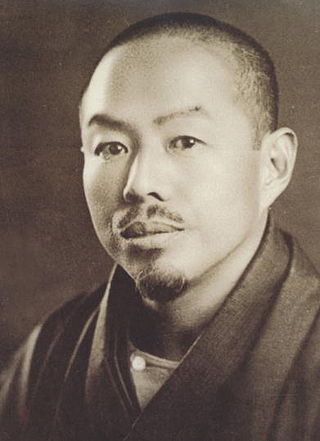Bokusui Wakayama
From Wikipedia, the free encyclopedia
Bokusui Wakayama (若山 牧水, Wakayama Bokusui, August 24, 1885 – September 17, 1928) was the pen-name of Shigeru Wakayama (若山 繁, Wakayama Shigeru), a Japanese author noted for his poetry in pre-World War II Japan.
This article includes a list of references, related reading, or external links, but its sources remain unclear because it lacks inline citations. (May 2024) |
Bokusui Wakayama | |||||
|---|---|---|---|---|---|
 Wakayama Bokusui | |||||
| Native name | 若山 牧水 | ||||
| Born | Wakayama Shigeru August 24, 1885 Togo, Miyazaki, Japan | ||||
| Died | September 17, 1928 (aged 43) Numazu, Shizuoka, Japan | ||||
| Occupation | Poet | ||||
| Nationality | Japan | ||||
| Education | Waseda University | ||||
| Japanese name | |||||
| Kanji | 若山 牧水 | ||||
| Hiragana | わかやま ぼくすい | ||||
| |||||
Life
Wakayama was born in Togo, Miyazaki, (now part of the city of Hyūga) as the eldest son of a doctor. He became interested in poetry from middle school, taking the name of "Bokusui" from the age of 18. He entered Waseda University in 1904, where one of his classmates was Hakushu Kitahara. After graduation, he was hired by the Chuo Shimbun newspaper in 1909, but quit after only five months.
He decided to devote himself to poetry, and became a disciple of Saishū Onoe. He traveled all over Japan and Korea, composing many tanka about the places he visited. He settled in Numazu, Shizuoka in 1920. He also loved sake, and heavy drinking eventually resulted in cirrhosis of the liver. He died in 1928.
Before he died he wrote a death haiku that reads:
Jisei nado |
A parting word? |
Works
Poetry books
- Umi no Koe (海の声) (published July 1908)
- Hitori Uta e Ru (独り歌へる) (published January 1910)
- Betsuri (別離) (published April 1910)
- Rojō (路上) (published September 1911)
- Shi ka Gejutsu ka (死か芸術か) (published September 1912)
- Minakami (みなかみ) (published September 1913)
- Shūfū no Uta (秋風の歌) (published April 1914)
- Sakyū (砂丘) (published October 1915)
- Asa no Uta (朝の歌) (published June 1916)
- Shiraumeshū (白梅集) (published August 1917)
- Sabishiki Jumoku (さびしき樹木) (published July 1918)
- Keikokushū (渓谷集) (published May 1918)
- Kuro Tsuchi (くろ土) (published March 1921)
- Yamazakura no Uta (山桜の歌) (published May 1923)
- Kuromatsu (黒松) (published September 1938)
External links
Wikimedia Commons has media related to Wakayama Bokusui.
- Official website (in Japanese)
- E-texts of Wakayama's works at Aozora Bunko (in Japanese)
- numazu city Wakayama Bokusui memorial hall(in Japanese)
- numazu city website(in Japanese)
- Hyuga city website(in Japanese)
- Places associated with Bokusui Wakayama(in Japanese)
- Monuments of Haiku by Bokusui Wakayama(in Japanese)
- Monument of Haiku by Bokusui Wakayama in Chiba prefecture(in Japanese)
Wikiwand - on
Seamless Wikipedia browsing. On steroids.
